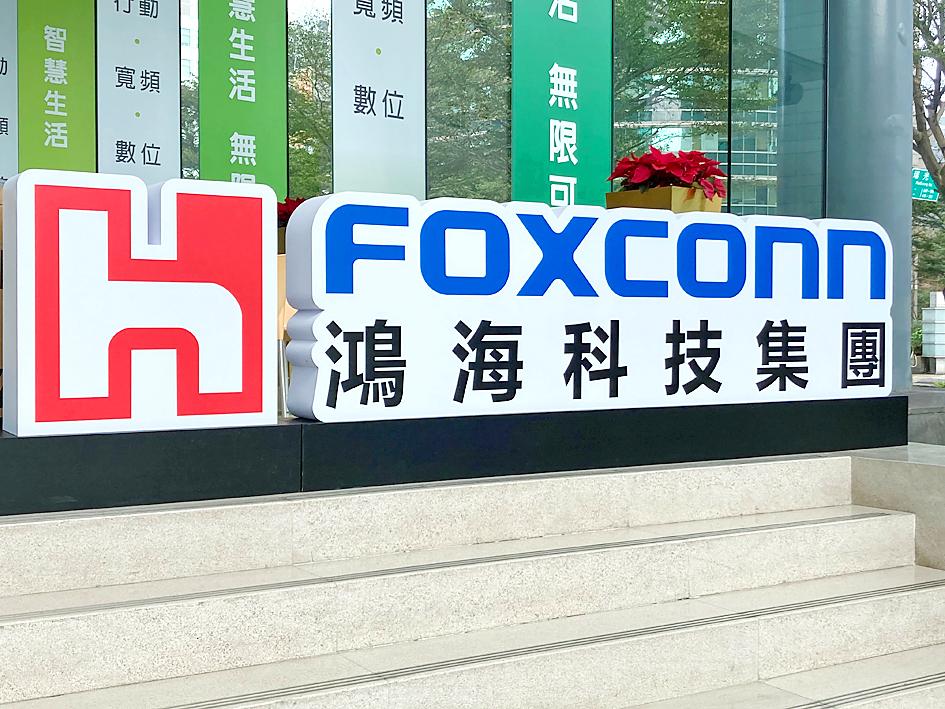Hon Hai Precision Industry Co (鴻海精密) is developing a faster-charging, longer-lasting battery for electric vehicles (EV) using lithium iron phosphate thanks to new developments in anode materials, the company said yesterday.
The remark came after the world’s largest electronics contract manufacturer signed a memorandum of understanding (MOU) with partners Giga Solar Materials Corp (碩禾電子), Long Time Technology Co (榮炭科技) and China Steel Chemical Corp (中鋼碳素) to “accelerate the development of anode materials for the next generation of made-in-Taiwan EV batteries.”
The key materials for such batteries are mesocarbon microbeads (MCMB), which China Steel Chemical manufactures, silicon oxide, which Giga Solar produces, and artificial graphite, which Long Time Technology provides, the MOU said.

Photo: Chen Rou-chen, Taipei Times
China Steel Chemical is the world’s biggest manufacturer of MCMBs, and it is in good control of upstream materials and proprietary technology for the manufacturing process, Hon Hai said.
“We anticipate that our partnership would help Hon Hai establish a strong place in the global EV battery supply chain and become widely used in electric vehicles, electric buses and battery storage applications,” it said.
The first application for the new lithium iron phosphate battery would be in electric buses, which the company has scheduled to reach the market in 2023, Hon Hai said.
Hon Hai has invested heavily in the EV space.
Its first electric bus is to be delivered in the second quarter of next year.
Hon Hai has stakes in Long Time Technology and Giga Solar Materials.
China Steel Chemical is a subsidiary of China Steel Corp (中鋼) that focuses on specialty chemicals for the production of steel.

Semiconductor business between Taiwan and the US is a “win-win” model for both sides given the high level of complementarity, the government said yesterday responding to tariff threats from US President Donald Trump. Home to the world’s largest contract chipmaker, Taiwan Semiconductor Manufacturing Co (TSMC, 台積電), Taiwan is a key link in the global technology supply chain for companies such as Apple Inc and Nvidia Corp. Trump said on Monday he plans to impose tariffs on imported chips, pharmaceuticals and steel in an effort to get the producers to make them in the US. “Taiwan and the US semiconductor and other technology industries

A start-up in Mexico is trying to help get a handle on one coastal city’s plastic waste problem by converting it into gasoline, diesel and other fuels. With less than 10 percent of the world’s plastics being recycled, Petgas’ idea is that rather than letting discarded plastic become waste, it can become productive again as fuel. Petgas developed a machine in the port city of Boca del Rio that uses pyrolysis, a thermodynamic process that heats plastics in the absence of oxygen, breaking it down to produce gasoline, diesel, kerosene, paraffin and coke. Petgas chief technology officer Carlos Parraguirre Diaz said that in

CHIP WAR: Tariffs on Taiwanese chips would prompt companies to move their factories, but not necessarily to the US, unleashing a ‘global cross-sector tariff war’ US President Donald Trump would “shoot himself in the foot” if he follows through on his recent pledge to impose higher tariffs on Taiwanese and other foreign semiconductors entering the US, analysts said. Trump’s plans to raise tariffs on chips manufactured in Taiwan to as high as 100 percent would backfire, macroeconomist Henry Wu (吳嘉隆) said. He would “shoot himself in the foot,” Wu said on Saturday, as such economic measures would lead Taiwanese chip suppliers to pass on additional costs to their US clients and consumers, and ultimately cause another wave of inflation. Trump has claimed that Taiwan took up to

SUBSIDIES: The nominee for commerce secretary indicated the Trump administration wants to put its stamp on the plan, but not unravel it entirely US President Donald Trump’s pick to lead the agency in charge of a US$52 billion semiconductor subsidy program declined to give it unqualified support, raising questions about the disbursement of funds to companies like Intel Corp and Taiwan Semiconductor Manufacturing Co (台積電). “I can’t say that I can honor something I haven’t read,” Howard Lutnick, Trump’s nominee for commerce secretary, said of the binding CHIPS and Science Act awards in a confirmation hearing on Wednesday. “To the extent monies have been disbursed, I would commit to rigorously enforcing documents that have been signed by those companies to make sure we get